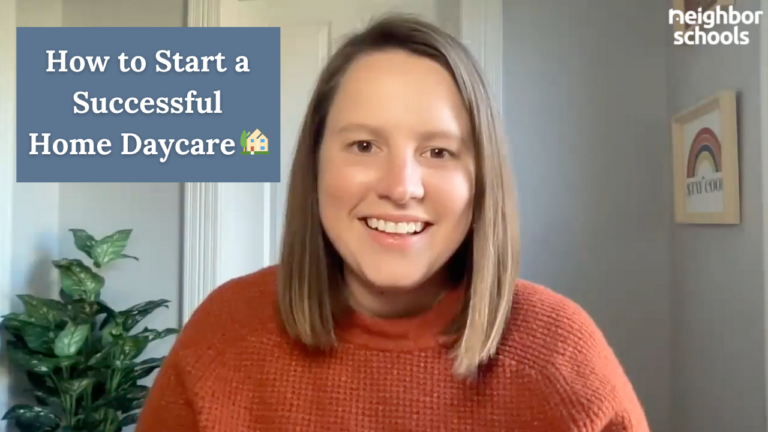When you’re starting out as an FCC Provider, setting boundaries can be tough. But veteran FCC Providers Gina Burke, Beth Goodwin, and Sabina Charlemagne will tell you this: when you work hard, you earn your families’ trust. And once you have their trust, you can set boundaries.
It’s one of the many lessons that most don’t learn until they’re in the thick of it. Why? Because even though there’s a ton out there about child development milestones or how to calm a crying baby, there aren’t many resources on how to take care of yourself and your business.
That’s why if you’re just getting started, you want to get advice straight from Providers themselves. Many will be happy to tell you about all the things that could’ve saved them time, money, and several headaches.
To pinpoint exactly what Providers should know right from the start, Gina, Beth, and Sabina joined Nap Time Zoom to share their wisdom with the new Provider community. Here are some of their most valuable insights.
1. Always put you and your family first
Gina, Sabina, and Beth will admit that even though you’re running a Family Child Care, it can be hard to set your business aside for family obligations outside the home. But they all agree on this: you should always put yourself and your family first.
To them, this means not denying yourself of precious family moments—like going to your child’s dance recital or celebrating your anniversary with your spouse. If you need to close early for the day to do these things, that’s okay. As long as you communicate it in advance, parents will most likely understand.
“The funny thing is: I started my family child care for my family, but there were so many moments I missed when my kids were younger,” Gina says of her FCC in West Boylston, MA. Now, I say ‘no more’ because I’ve earned the time off to be with my family. And if you’re in my program, you’ll know that this is important to me.”

2. Put together a vacation + holiday schedule and policy ASAP
Speaking of putting you and your family first, that also means recognizing that you will need a break at some point. Plan on taking a vacation at some point every year. The sooner you build vacation and holidays into your contract and your calendar, the easier it will be for everyone.
For example, Sabina and Gina both give themselves a standard two weeks of vacation a year, and they say it makes a world of difference.
“For all that we do, we definitely deserve a vacation to recharge now and then,” Sabina explains from her experience running an FCC in Mattapan, MA. “You just need a break sometimes.”
But you might be wondering how parents react to Providers taking a vacation—and if they still pay during those weeks.
Gina and Sabina say the parents will be fine, and yes, they still pay. As for how they handle payment during these times, they each approach it a bit differently.
Gina collects payments on her days off, just like she would on the days she’s open. It’s built into her contract, and she makes sure families agree to the policy before they enroll with her.
On the other hand, Sabina builds her vacation time into her normal rates. She doesn’t have the parents pay her when she’s closed because their payments are already covering her vacation days.
How you handle being paid for your vacation time is ultimately up to you. But both Gina and Sabina will tell you the most important part of having a vacation policy: make sure all the parents are aware of it well in advance, so they have time to make alternative arrangements for child care when you’re away.

3. Screen families on the phone before offering a tour
When you’re just starting out, getting inquiries is really exciting. Chance are you’ll want to enroll the first family you meet. But hold your horses, says the group. First, they need to be a good fit.
All three Providers agree that the best way to vet a new family is to screen them before offering them a tour. From their experience, it will set expectations for everyone and save loads of time and headaches in the future.
Case in point: Beth told a story of when she invited one of her first family inquiries to tour her home in Fitchburg, MA. She was under the impression that it was for only 1 child since she only had one spot left. When the family showed up—surprise! The mom brought along 3 kids, expecting them all to enroll with Beth.
Now Beth says she calls everyone before inviting them for a tour, just in case. “I’ve learned that it saves everyone’s time in the long run,” Beth says.

4. Always collect payment in advance
When she first started, one of Beth’s first families quickly began to fall behind on payment.
The family swore up and down that they would make up for it and pay her back in full soon. But as weeks went by and no payments were being made, Beth had to make a tough decision.
“I ultimately had to terminate them,” Beth explains. “It was really hard—I still think about the child every day—but this is a business, and I’m providing a service. I need to be paid.”
Looking back at it, Beth says she wishes she would’ve made the firm decision sooner, rather than giving the parents the benefit of the doubt.
But to avoid falling into a situation like Beth’s, there are a couple of ways to combat money issues, so you’re never behind on payment.
First, always ask for a deposit for the last two weeks of care when enrolling a family. It’s a tried and true way to protect yourself against potential payment issues.
Sabina says she didn’t ask for a deposit from families at first. But without it, she found herself in some tough situations.
“I would put up with a lot from a couple of families who were constantly late, or pushing back on me because I was worried that without their weekly payments, I would fall behind financially.”
Eventually, Sabina began requiring deposits, and it’s given her the financial cushion she needs if a family doesn’t work out.
Here’s another tip: set up your payment schedule, so you’re also getting paid before offering care. Some Providers prefer to have money for the week in hand right on Monday. Then they’re all set for the rest of the week.
For NeighborSchools Providers, payments for the next week of care are always due on the previous Thursday. That way, you and our team can work with the parent to iron out any payment issue way before drop-off on the following Monday.






